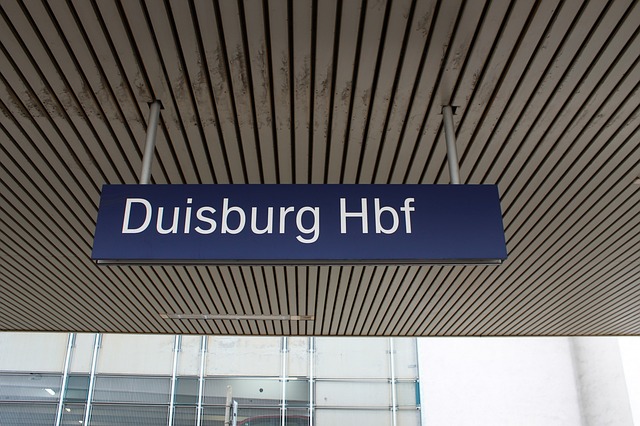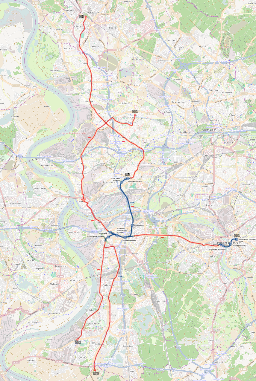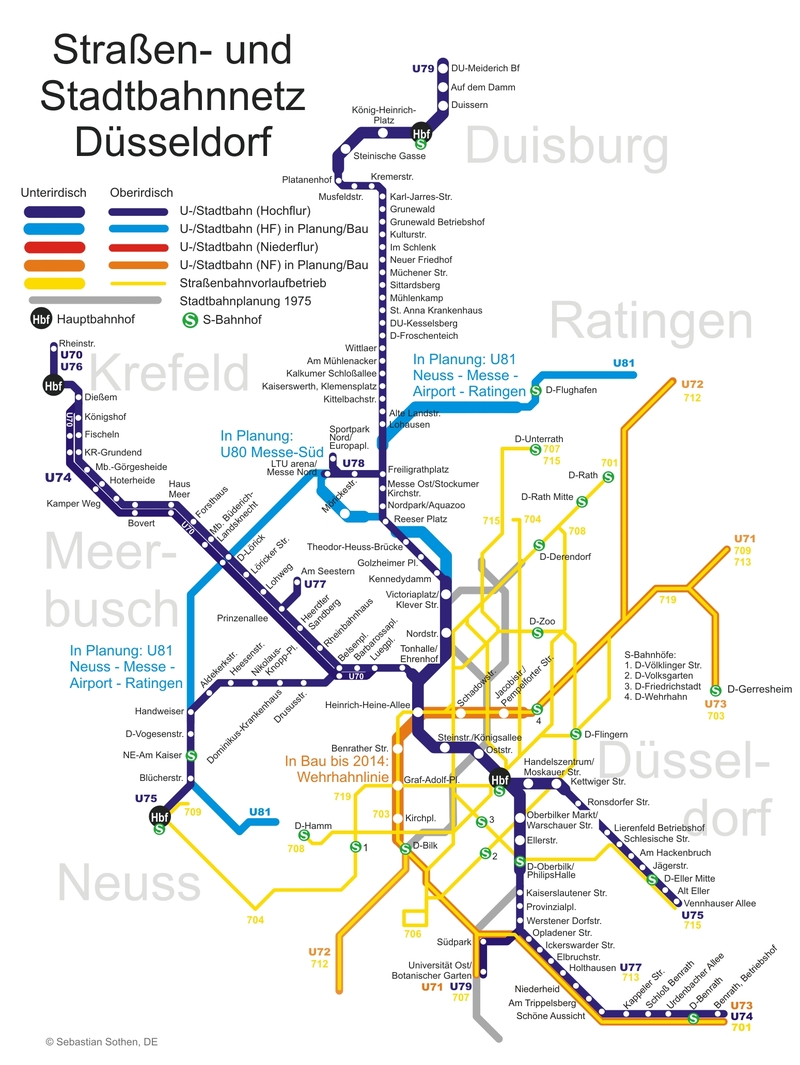The Duisburg Metro is a light rail train located in the city of Duisburg, in Germany. It is not a conventional metro system, but rather an urban train that combines different systems. A mix of metro, light rail and tram. It is also known as Stadtbahn. It was built over the existing tram network of the city, and is linked with the other Stadtbahn in the Rhine-Ruhr region, connecting it to four other cities.
This public transport system has three lines. Only one of them is actually a Stadtbahn (light rail), the other two classify as Straßenbahn (tram lines), but most people regard them as the same. The starting price for a ticket that covers the basic three-station ride is 1.60 euro ($1.88 USD). The normal operating hours vary according to each line, but the system runs from 4:30 a.m. to midnight, approximately.
Metros in Germany: Duisburg
Duisburg is a German city located to the west of the country, in the state of North Rhine-Westphalia. It is one of the cities in the confluence of the Rhine and Ruhr rivers, and is very close to Düsseldorf (about 50 km). This city had about 489,000 people living in it in 2011, and has been an industrial powerhouse throughout its history, especially in relation to coal, iron and steel.
Duisburg has a very important port, as it is the biggest inland port in the world, with a wharf that extends over 40 km. Despite being so far inland, it is considered a sea port because of the size of ships it can handle. The port is connected to Dortmund via the Rhine-Herne Canal and to the North Sea via the Dortmund–Ems Canal. Duisburg is the largest metallurgy industrial center in Europe.
Immigration has had a very important role in the development of the city: about one fifth of the total population is Turkish or of Turkish descent.
Climate is very similar to the rest of northern Germany, with an average of 4°C or 5°C in the coldest months and 14°C or 15°C in the warmest.
The Duisburg Stadtbahn is part of a larger intercity public transit system of the Rhine-Ruhr region. The system connects the cities of Duisburg, Bochum, Dortmund, Düsseldorf and Essen, and is governed in all five cities by the Verkehrsverbund Rhein-Ruhr or ‘Rhein-Ruhr Transport Network’ (VVR).
In the Duisburg network, two separate train systems are operational: a light rail train (line U79) and two tram lines (lines 901 and 903), but there are no substantial differences between the two. Together, they managed to transport about 30.9 million passengers in 2015.
Brief history
Due to its great economical and industrial importance, the construction of a public transport system was primordial for the city of Duisburg. The first steps in this regard were taken in the 1960’s, when both the federal and state governments promoted programs for the construction of light trains (the Stadtbahns). At the beginning, it was intended for the line to connect the city in an east-west route, but because other transport systems were preferred instead, it was decided in the 1970’s that the line would go north to south.
Construction on the light rail began in 1967, but like many other projects of its kind, it suffered from great delays from technical complications and cost overruns, which resulted in lack of resources. The first tunnels were only finished by the 1980’s. The system was inaugurated on July 11th, 1992, with only 5 stations in the city centre.
Lines and stations
The Duisburg metro or Stadtbahn is composed of three lines. One of those is a light rail train (line U79) and is the only actual Stadtbahn, the other two are lines 901 and 903, and are classified as Straßenbahn, or trams.
They share a common construction layout: subterranean in the city centre, and at surface level on the edges and suburbs.
Line U79
This light rail line has a total of 19 stations and starts its route from the northern bank of the Ruhr river, then heading south along the eastern bank of the Rhine river. The trains part from Duisburg and go south directly to the city of Düsseldorf. The first station is Meiderich Bahnhof.
Line 901
This is one of two tram (trolley) lines. It starts at the northeastern part of the city, at Obermarxloh Schleife station, and rapidly turns west along the Rhine. When it crosses the river, it turns east again to connect with line U79 in two stations, and then continues its journey all the way to Müllheim Bahnhof.
Line 903
The other tram line. This is the longest line of the system, it begins to the north of the city at Dinslaken Bahnhof and heads directly south towards the city. After Meiderich station and until Platanenhof station, it connects with line U79. Subsequently, it goes south parallel to line U79 and ends its run at Hüttenheim Mannesmann Tor 2.

Connections with other systems
As with other larger cities, Duisburg is not constrained to just its metro and tram systems to meet the demand for public transport its citizens have. This is especially true if you wish to travel to the suburbs.
Germany at large has many regional trains known as S-Bahn. These trains run along tracks distributed at the suburbs of large cities. Duisburg is no exception and is connected to the entirety of the S-Bahn system that operates in the Rhine-Ruhr junction. Lines S1 and S2 of this system cross Duisburg and arrive at the Hauptbahnhof (Duisburg main railway station), where it links to all three lines of the metro system.
Operating alongside the trains, there are several bus lines that connect the remaining areas of the city. Also run by the VVR, the buses are completely integrated into the Stadtbahn system, and tickets are valid for both transports. There are over 400 bus stops all over the city and suburbs, so it has the most reach and is the most accessible of all public transports in Duisburg.
As with most European cities, Duisburg is connected to the extensive train network that runs all over Europe, and movement within this system is vital. The Duisburg Hauptbahnhof or central station, mostly operated by the Deutsch Bahn, is the main link of the system, connecting all three metro systems, the S-Bahn and the long-distance trains.
Connections to the airport
The German city of Duisburg does not have an airport of its own, and instead relies on the close-by Düsseldorf airport. This airport is the third busiest in all of Germany, being only surpassed by the Munich and Frankfurt airports. The facilities include a train station that connects directly to the Duisburg metro system.
There are two main options to reach the Duisburg Stadtbahn from the Düsseldorf airport. One of them is to take several long-distance trains operated by the Deutsch Bahn until you reach the one that goes into Duisburg. This is not a suitable option for those who are heading straight into Duisburg, however. If that is the case, the second option provides a direct connection with the city via the S-Bahn system.
The train station located at the Düsseldorf airport has, on its lower level, an S-Bahn station that serves line S1. This train will take its passengers directly to the Duisburg Hauptbahnhof, at the Main Railway Station at Duisburg. From here, the three metro lines are available, so this option is the easiest if you need to use the Stadtbahn right after you arrive at the Düsseldorf airport.
Schedule and timetables
The Duisburg transport system has a very long working day from very early in the morning all the way to midnight:
In line U79, the first train starts its operations at 4:52 a.m., and the last train leaves at 12:35 at night. Trains normally run every 15 minutes, but during the busiest hours the frequency is reduced to a train every 10 minutes.
Trains start a bit earlier in line 901, as the first tram runs at 4:20 a.m., but it also finishes a bit earlier, as the last one leaves at 11:40 p.m. Trains also run every 15 minutes in this line during off-peak hours, but this wait is halved when there are many passengers requiring service.
For line 903, the starting train leaves earlier than the others: at 3:54 in the morning. The last one departs at 12:34 at night, so it is the line that has the longest operating hours. The frequency of the line is also better, as there is an average of 8 minutes between trains throughout the entire day.
Tariffs, tickets and cards
The pricing system at the Duisburg metro is dynamic. This means that you pay according to how far you intend to travel. To simplify this system, the company running the metro has adopted a four-zone pricing scheme: zones A, B, C and D.
Following this reasoning, the cheapest ticket one can buy allows for a short trip of 3 stations. This ticket costs €1.60 (about $1.88 USD). If you buy a ticket for zone A, it will cost €2.70 (about $3.15 USD). To travel to zone B, you will need to pay €5.80 (about $6.77 USD). For zone C, prices go up to €12.10 (about $14.12 USD). If you wish to travel to zone D, it will cost €15.00 (about $17.50 USD).
There are two other options for individual tickets: a 4-journey ticket and a 10-journey ticket. If you acquire the first one, pricing will be as follow: short trip: €5.90 (about $6.89 USD), zone A: €10.00 (about $11.67 USD), zone B: €20.90 (about $24.38 USD), zone C: €42.80 (about $49.95 USD), zone D: €52.50 (about $61.27 USD).
For the 10-journey ticket, prices are: short trip: €13.90 (about $16.22 USD), zone A: €22.00 (about $25.67 USD), zone B: €44.00 (about $51.35 USD), zone C: €88.00 (about $102.69 USD), zone D: €100.00 (about $116.70 USD).
On the other hand, there are many other tariffs especially focused on long term travel. There are eight main monthly ticket options divided into two categories. The first category is to buy a monthly ticket that is valid from the first day of each month. Here we have four different monthly admissions: Ticket2000 Abo, that allows the user to transport a bicycle, to have a companion travel with them from 7 p.m., and makes the ticket transferable. Ticket2000 Abo 9 Uhr has the same benefits, but only from 9 a.m. Ticket1000 Abo is cheaper, as it allows for the use of the system but without the benefits mentioned above. Ticket1000 Abo 9 Uhr grants permission to use the system from 9 a.m.
The other category of monthly tickets allows for a bit more flexibility, as they are valid for 30 days from the day they are bought. The four options are exactly the same as the ones above, but a little more expensive due to that flexibility. We have 30-TageTicket2000, 30-TageTicket2000 9 Uhr, 30-TageTicket1000 and 30-TageTicket1000 9 Uhr.
All those options have different pricing according to the distance travelled, so it can be confusing. A summary of pricing is provided in this table (all pricing in euro):

There are many other options regarding long-term tickets: there are special plans for young children, for teenagers, for students (month and semester plans), for the elderly, among others.
Future expansions
As of 2017, the entire system runs on the eastern bank of the Rhine river, so all planning for future expansions is centered on connecting the western part of the city through bridges. However, most of the population in Duisburg does not use the public transport, they prefer to move by car. Because of this, the local authorities have made it their objective to make mass public transport much more accessible, to make it more universal so that more people use it daily.
There are no set number of stations to be added to the system, and no construction has commenced either. However, a masterplan for the Duisburg Stadtbahn 2027 is being developed. It is considering urban planning, population growth, low usage among citizens and limited reach within the great urban area as key elements to keep in mind and solve with the projected expansions.
Advice
Before entering any public transport system in Duisburg, it is important to keep in mind some basic tips:
The German public transport operates with a system of trust (honour system). This means there are no physical barriers that impede the entrance. However, all tickets must be kept close-by and up to date, as any worker can ask for the ticket to check if it is valid.
In Europe, terrorist threats are taken very seriously, so any bag or package left unattended will attract attention and could even become a security issue with teams being dispatched to the site. It is very important to keep all belongings at hand.
Fun facts
- The Duisburg system is not an independent entity, as it is part of a larger system: the Rhine-Ruhr region transport system.
- Duisburg is the final stop for the Yuxinou Railway, a freight line connecting Germany to the Chinese city of Chongqing through many other European and Asian nations including Poland, Russia and Kazakhstan. It is part of a growing railroad network along the so called ‘New Silk Road’.
- It has two different train systems working together (albeit on different lines): a light rail and two tram lines.
- Despite it covers a large area of the eastern part of the city, most people living in the city don’t use it. Many consider it insufficient.
Tourism and sightseeing
Duisburg is a growing destination for tourism. This industrial city has shown its friendly and ecological face to anyone who decides to visit, exposing many attractions that are easily reached through the public transport system.
Landschaftspark: this is probably the biggest tourist attraction in Duisburg. An old coal and steel production plant and metal processing center, the Landschaftspark is now a public park that reminds of the industrial roots of the city while expressing modern ecological values, and the importance of memory. It is especially attractive at night, as it has many illuminated areas that result in a very pleasant view. To reach it, it is necessary to get off at the Landschaftspark-Nord station from line 903 and walk about 10 minutes.
Duisburg zoo: founded in 1934, this is one of the oldest zoos in Germany, nationally renowned for its dolphins and koalas. The dolphin show is very well elaborated, and one can also feed the giraffes. Access is simple and it is easily reached, as it is served by line 901 through the Zoo/Uni station.
Tiger & Turtle: considered by many tourists as the most special element and a unique landmark of the city. It is an unconventional roller-coaster: one you can walk. It is over 21 meters high and you can enjoy panoramic views of the surrounding area. To reach it, you must take line U79 line and get off at Duissern station.
Metro map of Duisburgo
Map via commons.wikimedia.orgMaps by Sebastian Sothen, DE See map full resolution. It may take a little bit to load.
Duisburgo Stadtbahn map
- Also Known As: Stadtbahn
- Passengers/Day 85000
- Fares: 1,60€
- 24h operation: No
- Air Conditioning: No
- Walk between platforms: Yes
- Driverless trains: No
- Screen Doors Platforms: No
- Max. Speed: 60km/h
- Operator: Duisburger Verkehrsgesellschaft (DVG)
- €1.60 - 14.60
- Duisburgo Metro Official Website
- Tlf: +49 203 604 4555
Help us
If you consider that the information we provide is wrong, not accurated, outdated, translation contains errors, and you would like to help us to improve the file...you can contact us here.
Feel free to contact us if you dont find the system you're looking for and we'll add it as soon as we can!
Thank you very much!












